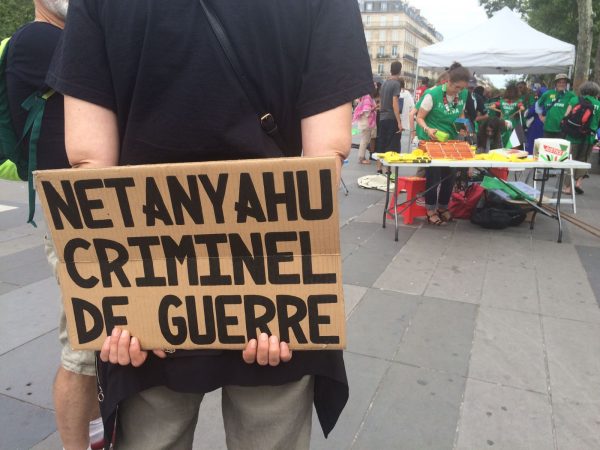
On July 16 and 17, 1942, the French police arrested an estimated 13,000 Jewish people in Paris, including thousands of children. They were detained for four days in the Vélodrome d’Hiver (Vél d’Hiv), a stadium originally built for cycling races, before being deported to Auschwitz. Less than a hundred of those arrested in the raid would survive the Holocaust.
However, Netanyahu’s visit to France to commemorate the 75th anniversary of the Vél d’Hiv raids, one of the most somber events in France’s recent history, has led some people to denounce the politicisation of a tragedy.
The French organisation the UJFP (an acronym for the French Jewish Union for Peace, or, in French, Union juive française pour la paix) said that they were “shocked” that the Israeli leader had been invited to commemorate a “Franco-French crime against humanity”, echoing the sentiment that the Vél d’Hiv raid was an event that the French had to come to terms with by themselves, without making it a matter of international diplomacy.
The Communist Party also protested that Netanyahu was far from the bearer of a “message of peace”, a reference to Israel’s human rights abuses against Palestians in the occupied West Bank and besieged Gaza Strip, as well as its treatment of Israeli Arabs.
Israeli-Palestinian conflict
After the ceremony Sunday morning, Netanyahu — who has not visited France since a massive rally against terrorism after the January 2015 Charlie Hebdo and kosher supermarket attacks — will hold a bilateral meeting with Macron. The tone is expected to quickly turn from commemoration to diplomacy.
The meeting will provide an opportunity for the Israeli leader to test the waters with his French counterpart and get a better idea of the role Macron intends to play in the longstanding Israeli-Palestinian crisis.
“In terms of the Israeli-Palestinian conflict, France’s position is still quite vague,” Jean-Paul Chagnollaud, a researcher who specialises on the Palestinian issue, told the AFP.
During a recent meeting with Palestinian President Mahmoud Abbas held at the Elysée Palace, Macron reiterated France’s support for a two-state solution and condemned Israeli colonisation, two traditional French diplomatic positions on the issue.
But Macron didn’t specify if he planned to continue the initiative launched by his predecessor, François Hollande, which extolled an international approach to resolving the conflict. In January 2017, Hollande organised an international conference on the Middle East, provoking Israel’s ire.
“Netanyahu is a frightening political animal and wants to ensure that France doesn’t get any more involved in the issue,” noted Chagnollaud, who said that both of Macron’s predecessors– Hollande and, before him, Nicolas Sarkozy– “hoped for good relations with Netanyahu, but were disenchanted pretty quickly.”
On Thursday, Israeli historian Zeev Sternhell published an editorial in the French daily Le Monde titled: “Monsieur Macron, be firm towards Monsieur Netanyahu”.
Sternhall doesn’t mince his words when describing what he perceives as Netanyahu’s intentions.
“Netanyahu wants France, who — alongside Germany — speaks for Europe, to abandon the idea of Palestinian independence and limit itself to the indefinite preservation of the status quo,” Sternhall wrote, also emphasising Netanyahu’s desire to make Israel a uniquely Jewish state, thus discriminating against its Muslim citizens.
Sternhall further implored Macron’s France to “accept its responsibilities” in mediating a solution to the crisis.
The US-mediated roadmap to peace collapsed in 2014 and there has been no progress on the Israeli-Palestinian peace process since.
“France and Europe need to take responsibility for this question. There might be an opportunity, given the state the White House is in and the fact that [US President] Donald Trump’s plans [for the negotiations] remain vague and mysterious,” former French ambassador to Israel, Elie Barnavi, told the AFP.
During their meeting, the French and Israeli leaders are also likely to discuss the situation in Syria, which is a cause for increasing concern for Israel following Iran’s growing role in the conflict. Netanyahu may also be looking for a better understanding of Macron’s position on Iran, Israel’s arch-enemy.
(FRANCE 24 with AFP)

Leave a Reply
You must be logged in to post a comment.